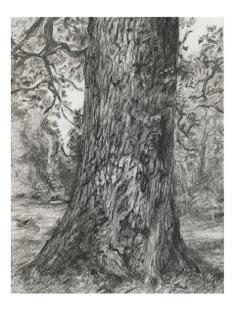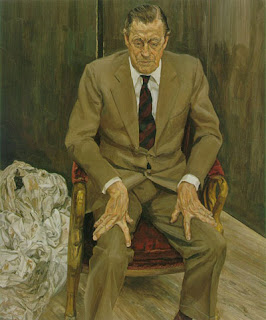Saturday we went to Versailles. It was pretty awesome, but we spent too much time in the gardens, mostly because it started pouring and we had to hide inside for a bit. So we only had 45 minutes for the castle, but it was pretty spectacular. I want to be a king and squeeze the peasants dry someday... pictures on my facebook profile.
Sunday we went to the Centre Pompidou, a modern art museum, where we got to see two awesome exhibitions, Dreamlands and Lucian Freud. The first is titled in reference to the Coney Island theme park of the same name, and details humanity's obsession with having these Ultimate Designs of fantasylands, and how they have shaped our urban fabric. Coney Island in the early 20th century is one example, where the skyscraper was realized and high-speed elevators utilized for the first time. The exhibition credits this with shaping the skyscraper obsession that would overtake New York. Los Vegas is another, and so is Dubai and EPCOT (the Experimental Prototype Community of Tomorrow). It was a great exhibition and had lots of multimedia displays, including video from the end of the Truman show, abandoned movie sets in Rome, and Walt Disney hucking the EPCOT idea to investors (with swamps on either side, they won't need a fence to keep out trespassers!).
I agree with the main point of the exhibit, which is that not only have these creations shaped the way in which we think about leisure, but also that "they have also become realities: pastiche, copy and artifice now provide the environment in which real life takes place, their normality dissolving the boundary between dream and reality." The only thing is that, like dreams, close examination reveals the strange unreality of these products, and living among them, in fantasy, ultimately destroys our real world and our souls because we fetishize the escapism. Las Vegas is a great example of this - a whole town built around the fantasy of easy money and loose sex, and incredible wonders of the world all in one spot. The trouble is its all fake, but because we want it to be real so badly, we get caught up in the hype, and forget how and why we should build REAL cities and REAL places to live. Las Vegas offends me, not my sensibilities but my senses, my eyes and ears. It hurts to be in unless you're drunk and forget that it's all just cheap plaster board. With the right mind it can be fun for a weekend, but even that is a stretch, and the city certainly doesn't deserve its exhaulted status in movies and pop culture.
But the thing is, we're such suckers for a good story, and Las Vegas tells a good story. Radiolab has a show about how not just once, but thrice Americans got suckered into believeing that the radio show War of the Worlds was real. And as they say in crowd management, the problem isn't the 10% of the people that spook easily - it's the 80% that spook when they see the first 10% freak out. One town's mayor even sent the national guard to the area where the attack was supposedly taking place, all but guaranteeing the rest of the town believed the attack was real (it's a good episode, you should listen to it). But the reason they talk about is that we are culturally and genetically programmed to listen and pay attention to stories - it's how we shared information for thousands if not tens of thousands of years (clever little communicators that we are). So it makes sense that we keep building shit like Dubai, even though it's kind of dumb and bad for us outside the sense of pure amusement, and destroys (ironically) the very experiences we crave. One photographic exhibit had accompanying text discussing how the iconic travel photograph of XX, such as "me in front of the Eiffel tower" has simultaneously universalized and destroyed the whole concept of travel and new cultures. As a a frequent traveler, I'm sad to say I agree. And now here's me in front of the Eiffel tower:

And even better is to put the Eiffel tower next to the pyramids next to a giant freaky Circus Circus, a la Vegas, right?? Right.
The other exhibition was of work from the painter Lucian Freud, which I also really enjoyed. I like the way he paints faces; Freud says that his goal is for his paintings to be not representations, like a photograph, but more like an actor portraying a person, sometimes intensifying the reality - which is exactly how Freud describes the objective of his work. He paints many nudes, although he prefers the word "naked," because he is interested in the human body "in all its rawness," and not the typical "artistic nude." His paintings seem to observe and meditate on the human body, but not celebrate it. Perhaps his fondness of drawing naked bodies makes sense, for he also states that he seeks to make his paint "like flesh." The bodies do seem real; one portrait of a fat naked woman laying on a chair, breast cupped in her hand, brought the reality of the body home enough to me to wonder what it would be like to have all that extra flesh. I couldn't imagine it, and it seemed so strange, but I liked the way the painting made me consider the body anew (then again, women might see Freud's portraits of men and wonder what it's like to have a big weird dangly penis, but I have no problem understanding that. I guess we all have our "normal"). I also liked how for perhaps the first time, I approached paintings to inches to examine the brush strokes. Somehow the work of Freud seemed particularly amazing in its ability to take small clumps of paint, just color mashed onto canvas really, and do it in a way that when examined from afar, seems not just like a person, but an enhanced version of a person. A pen-and-ink of a tree made me think the same thing. I'm going to stop writing now, because my utilitarian style just feels utterly useless to describe art! Below are some examples to get you started:



No comments:
Post a Comment